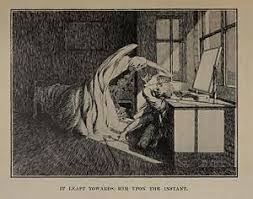If you travel around the world, you will encounter beliefs about ghosts and spirits in most places you visit. *
These beliefs date back several centuries. The terminology changes from country to country but these beliefs are similar and fascinating in nature.
This also applies to religions. From Christianity to Buddhism, ghosts or spirits play a role. Here are just a few of these traditions and beliefs.
 |
| Yurel: The Ghosts of Japan. |
These beliefs date back several centuries. The terminology changes from country to country but these beliefs are similar and fascinating in nature.
This also applies to religions. From Christianity to Buddhism, ghosts or spirits play a role. Here are just a few of these traditions and beliefs.
One similar belief found in many rural cultures around the world is “White Ladies.” These ladies frequently are described as having suffered a tragic death or suffered some major trauma in life-- they are often harbingers of death.
Irish Banshees are White Ladies. These female ghosts are often described as having lost or betrayed a husband or fiancé.
Another universal theme is the belief that the dead manifest in the form of spirits.
Most religions believe the spirit is the soul of a deceased person. This dates back to ancestor worship in pre-literate cultures.
Irish Banshees are White Ladies. These female ghosts are often described as having lost or betrayed a husband or fiancé.
 |
| Classic Ghost Story image. |
Most religions believe the spirit is the soul of a deceased person. This dates back to ancestor worship in pre-literate cultures.
Spiritual practices, such as funeral rites are designed specially to appease the spirits of the dead.
One common belief in many cultures is ghosts are being held from the afterlife as punishment for sins committed while they were alive.
Most religions mention guardian angels or protective spirits.
For example, some cultures believe in ancestral spirits. These ancestral spirits are considered the soul continuing on without the physical body. This, as mentioned above, is a belief in most religions.
In China, these souls or ghosts are held in high esteem. In fact, they are considered an active member of the family. They are respected and honored because the Chinese believe these ancestral spirits will help them achieve their goals, e.g., better crops, or to thrive in business, etc. **
Often cultures describe ghosts as solitary essences that are often mist-like. It is said they are connected to particular locations, objects, or people they were associated with in life.
Scores of cultures have stories of phantom armies, ghost trains, phantom ships, like the Flying Dutchman and the soldiers at Gettysburg. A belief in ghost animals is common as well.
Most cultures have some ritual to contact the spirits of the dead, such as séances.
Many believe the dead return to haunt the living. Also, most distinguish between the more malignant, restless ghost, and positive spirits.
While the era we live in now is considered the "age of science," this fact has not dampened many people's belief in ghosts. People still find them as compelling and interesting as ever.
The reason for this might be that since science alone cannot explain the broader questions, we have about life and death. Hence, some seek other fields, such as religion or the supernatural for reassurance.
In a future post, I will share more specific beliefs surrounding ghosts and spirits from around the world.
* Of course not everyone who believes in ghosts agrees on what exactly a spirit is. Some insist that the appearance of ghosts proves survival after death. Others state that such phenomena represent other dimensions of reality. And today, many cultures that once held a strong belief in ghosts have now left these beliefs to their ancestors.
** When communism took hold in China, many of the traditional ghost beliefs were discouraged.
For example, some cultures believe in ancestral spirits. These ancestral spirits are considered the soul continuing on without the physical body. This, as mentioned above, is a belief in most religions.
In China, these souls or ghosts are held in high esteem. In fact, they are considered an active member of the family. They are respected and honored because the Chinese believe these ancestral spirits will help them achieve their goals, e.g., better crops, or to thrive in business, etc. **
 |
| Victorian Era Ghosts |
Often cultures describe ghosts as solitary essences that are often mist-like. It is said they are connected to particular locations, objects, or people they were associated with in life.
Scores of cultures have stories of phantom armies, ghost trains, phantom ships, like the Flying Dutchman and the soldiers at Gettysburg. A belief in ghost animals is common as well.
Most cultures have some ritual to contact the spirits of the dead, such as séances.
Many believe the dead return to haunt the living. Also, most distinguish between the more malignant, restless ghost, and positive spirits.
While the era we live in now is considered the "age of science," this fact has not dampened many people's belief in ghosts. People still find them as compelling and interesting as ever.
The reason for this might be that since science alone cannot explain the broader questions, we have about life and death. Hence, some seek other fields, such as religion or the supernatural for reassurance.
In a future post, I will share more specific beliefs surrounding ghosts and spirits from around the world.
* Of course not everyone who believes in ghosts agrees on what exactly a spirit is. Some insist that the appearance of ghosts proves survival after death. Others state that such phenomena represent other dimensions of reality. And today, many cultures that once held a strong belief in ghosts have now left these beliefs to their ancestors.
** When communism took hold in China, many of the traditional ghost beliefs were discouraged.

No comments:
Post a Comment